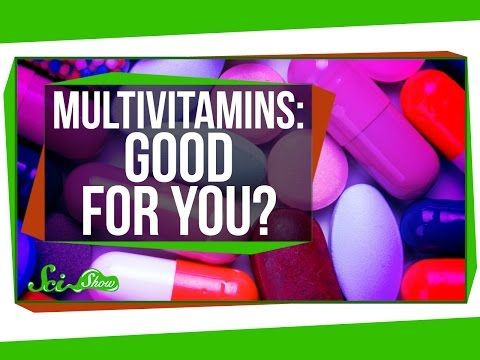Are Multivitamins Actually Good For You? Eating A Well-Balanced Diet Is More Important

Multivitamin supplements that contain several vitamins and minerals in varying doses within one or a few pills are often touted as essential for good health. Vitamin A, C, and D, as well as calcium, iron, and magnesium, among numerous others, are packed into a one-daily dose, making this seem like a simple way to get the vitamins and minerals you need from a small tablet or pill.
But multivitamins and their efficacy remain controversial. While supplements may help if you’re deficient in a specific nutrient, at the end of the day, it all comes down to your diet, say some critics. In a new SciShow video, host Michael Aranda discusses why in certain cases multivitamins may not be so good for you after all. “At best, they probably aren’t doing very much,” Aranda says. “At worst, they could be doing you harm.”
Before supplements, humans had only foods to rely on for the vitamins their bodies needed to function. Vitamin A, for example, can be found in milk, eggs, liver, and green vegetables. Vitamin C can be found in oranges or dark leafy greens. And cheese, milk, yogurt, fortified tofu, and broccoli are all high in calcium. A well-balanced diet should, in theory, provide us with all the vitamins and minerals we need. Only when you’re sorely lacking a vitamin — and aren’t eating a reasonably healthy diet — do you need supplements.
Aranda goes on to explain that these vitamins are generally divided into two categories — fat-soluble (meaning they dissolve in lipids), and water-soluble (meaning they dissolve in water). Water-soluble vitamins tend to be excreted from your body quickly if you take in more than you need, while fat-soluble vitamins in excess are usually stored in tissues. If too much fat-soluble vitamins build up over time, they may do the body harm.
The Food and Nutrition Board created Recommended Daily Allowance (RDA) to guide consumers in not taking unsafe amounts of vitamins or minerals within supplements. If you exceed RDA limits, your body will excrete the excess nutrients quickly, or will store it in tissue where it may accumulate to hazardous amounts. “When you take a multivitamin that has more than 100 percent of the RDA for different vitamins, your body might not be digesting and absorbing it all,” Aranda states.
If you’re taking supplements, however, that doesn’t mean you should toss them all out immediately. Ask your doctor before choosing a multivitamin regimen. Evidence on the subject is conflicting; some research has found that supplements are beneficial to health, while others have found the opposite. Many find that supplements have little to no effect at all. That being said, it’s likely a better idea to focus on consuming a well-balanced diet — complete with protein, whole wheats, and plenty of green leafy vegetables — than to turn to health in a pill.
Published by Medicaldaily.com



























